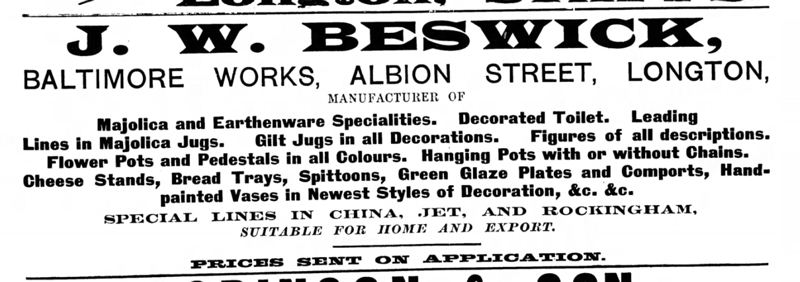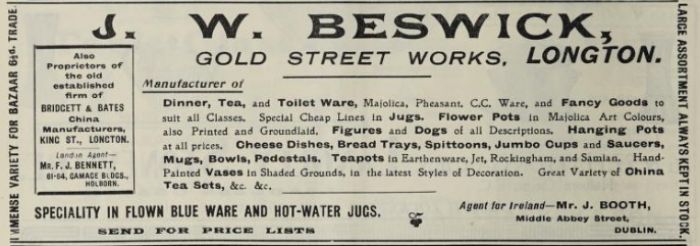|
Manufacturer of Majolica
and Earthenware at
the Baltimore
Works and from 1898 the Gold
Street Works, Longton,
Stoke-on-Trent, England
-
James
Wright Beswick was originally in the coal-mining industry, but his
pits at Chell had to close down in 1892.
-
J. W.
Beswick's wife Esther Annie Beswick has been in partnership with Thomas
Heath at the Baltimore Works - this partnership was dissolved in
October 1893. Thomas heath continued on his own account.
-
The
following year J. W. Beswick's son John, having studied
the potter's craft at Tunstall, then joined with his father to start
the pottery business as partners at the Baltimore Works, Albion
Street, Longton.
-
In
1897 the Gold Street Works came onto the market, they acquired them
and moved there the following year.
-
From
that date the firm gradually expanded its activities, producing
under-glaze, printed dinner, tea and toilet wares as well as hospital
wares and fancy goods, such as pots and pedestals, vases in the
so-called 'majolica' glazes, toby-jugs, Old-English style figures and
animals.
-
In
1918 the Warwick China Works in Chadwick St, Longton was purchased
allowing the business to manufacture bone china ware and fancy items
in addition to its extensive domestic earthenware. This business was
called Beswick & Son(s).
-
The
founder, J. W. Beswick, died in May 1920 and his sons John and Gilbert
Beswick assumed control of the business. Of the two sons, John Beswick
was the driving force behind the business and on his death in 1934 his
son John Ewart Beswick assumed control and his uncle Gilbert Beswick
continued as the marketing manager.
-
From
1934 to 1938 the business was controlled by John Beswick’s
executors, but in 1938 the business was incorporated as John Beswick
Ltd with John Ewart Beswick and his two sisters Dorothy and Gladys
Beswick as the Directors.
-
In
1945 the adjoining premises of H.
M. Willamson & Sons were acquired and in 1957 the factory of Thomas
Lawrence was purchased to allow further expansion of production.
-
From
1957 the business traded as a public listed company.
-
John
Ewart Beswick had no heir and in June 1969 he sold the entire share
capital to Doulton & Co Ltd.
Doulton,
1969 - 2002
-
After
its 1969 takeover, Doulton continued to produce the Beswick animal
models and figurines under the Beswick name, although the range was
reduced and only a few new models entered production.
-
From
early-1989 Doulton ceased using the Beswick trade name, although the
Gold Street factory continuing to produce the same models with a Doulton
backstamp. The Beswick mark was briefly resurrected for the centenary of
the name 1994.
-
Doulton
ceased production of the ‘Beswick’ models and closed the Gold Street
factory in 2002, the site being sold for development in the following
year.
UKI Ceramics (2005-
-
In
2004 Doulton put the Beswick ‘brand’ up for sale with an asking
price of £1.5 million and, in mid-2005 it was sold to John Sinclair,
owner of a chain of antique shops.
-
The
new owner announced plans to re-start production of prestige
limited-edition Beswick collectors’ wares in Tunstall and to sell
mass-market Beswick figures and ornamental wares manufactured in
Malaysia by the giftware company Enesco.
-
Sinclair
Collectables was continuing to market ‘Beswick’ products in 2023.
significant
information courtesy: A handbook of British Pottery Manufacturers
1900-2010, Michael Parry |
![]()

